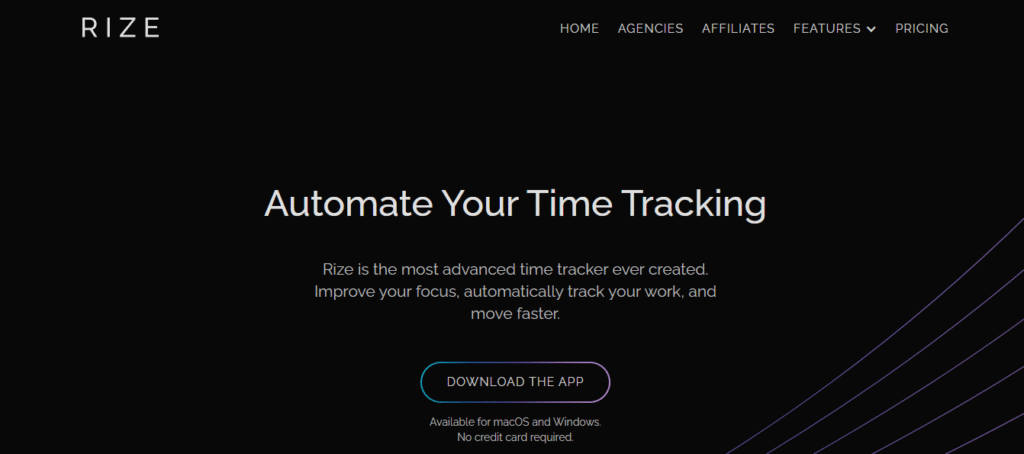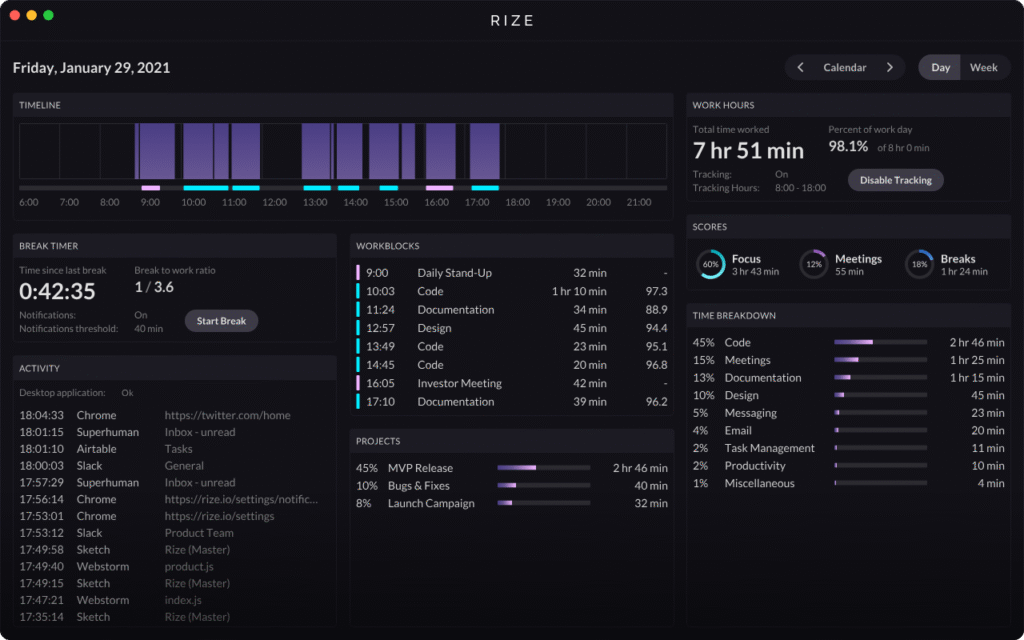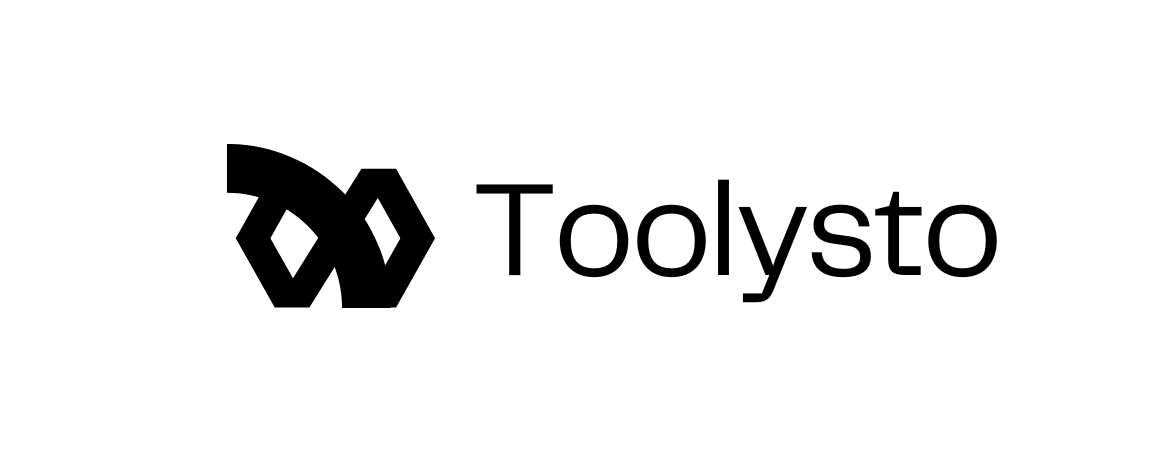If you’ve ever ended a workday wondering where your time went, jumping from Slack to Figma, from Notion to a dozen browser tabs, you’re not alone. Most of us lose track of how much time goes into context switching, messages, and “just a quick check” moments that pile up across the day.
That’s the problem Rize sets out to solve. It’s an AI-driven time-tracking tool that automatically logs what you work on, when, and how often your focus gets interrupted. The goal isn’t to punish distractions, but to help you see patterns clearly, so you can work with intention rather than guessing what drains your attention.
Rize promises to do this without manual timers, spreadsheets, or constant app switching. It runs quietly on your desktop, turns activity into usable insights, and encourages healthy work habits. But how well does it work in real use? Let’s break it down with our direct experience.
What is Rize?

Rize is a desktop-based time-tracking and productivity analytics tool for macOS and Windows. It automatically detects which apps and websites you’re using, how long you stay in them, and how often you switch tasks.
The difference between Rize and traditional time-tracking tools is its focus on focus. It doesn’t just measure hours; it measures context switches, breaks, and deep-work sessions. The idea is to give you a clearer picture of how you actually work, not just how long your computer is on.
Everything runs locally with background tracking. There’s no need to start or stop timers manually. Rize syncs with your calendar to recognize meetings, classifies activities by type (e.g., coding, writing, research), and builds daily and weekly reports showing exactly where your attention goes.
Who is Rize for?
Rize targets people who rely on focused work for a living, developers, designers, writers, consultants, or anyone who juggles multiple projects across tools.
It’s particularly helpful for freelancers and small teams that care about personal productivity but don’t need heavy timesheet systems. If your goal is to understand work patterns, minimize distractions, and build a balanced schedule, Rize fits neatly into that workflow.
We also found it appealing for remote professionals. The automatic tracking captures both solo deep work and meeting-heavy days, giving a realistic view of time distribution without needing to fill out forms at the end of the day.
What features does Rize offer?
1. Automatic Time Tracking
Once installed, Rize starts recording which applications and websites you use, how long you stay in them, and when you switch. Everything is categorized automatically; for example, spending thirty minutes in Visual Studio Code falls under “Development,” while Slack messages get grouped under “Communication.”
The auto-categorization works surprisingly well. Over time, Rize learns your habits and improves accuracy. For tasks that don’t fit a category, you can manually tag or rename them to keep the data consistent.
It also integrates with Google Calendar and Outlook, so meetings appear in your activity feed. This keeps scheduled events aligned with real activity, making it easier to see how much of your week goes to planned work versus spontaneous tasks.
2. Focus and Habit Insights
Rize’s standout feature is its focus metrics. Instead of just showing “hours worked,” it breaks your time into deep work, context switching, and distractions. You can see how often you get interrupted and what percentage of your day is spent in uninterrupted sessions.
There’s a clear visual representation of this data, timelines showing productive streaks, breaks, and interruptions. You can also track habits like “stop checking email before lunch” or “keep coding sessions above forty minutes.”
These insights become useful once you start noticing patterns. For example, you might find your focus peaks in the morning but drops sharply after 3 p.m. That awareness helps with scheduling real work around your natural rhythm.
3. Projects and Custom Categories
Rize recently added “Projects,” which lets you group tasks under a client, campaign, or goal. You can assign tracked time to specific projects manually or set up rules that auto-assign based on the app or website name.
Custom categories allow fine-tuning. You can merge, rename, or hide categories that don’t matter. Exports to CSV make it easy to review data outside the app or share weekly summaries with clients.
This feature brings Rize closer to a lightweight team tracker while still keeping the clean, personal-productivity design.
4. Distraction Management
Rize doesn’t block websites, but it helps you see exactly how much time is lost to idle browsing or multitasking. The “Focus Score” metric quantifies it: every time you switch apps, it counts as a context break. Over the week, you get an average score showing how consistent your attention was.
There’s also a simple break reminder system. After long uninterrupted sessions, Rize prompts you to pause, stretch, or step away, without feeling intrusive. It’s a small feature, but it prevents burnout when you’re locked in deep work.
What sets Rize apart from other tools
Most time trackers focus on billable hours. Rize flips that; it’s about understanding attention and work quality. It doesn’t expect you to remember to start or stop timers, and it doesn’t clutter your workflow with manual data entry.
The interface is sleek and built for individuals, not massive teams. The dashboard looks more like a fitness tracker for your brain, showing how much focus you achieved, when you took breaks, and how consistent your work rhythm was.
Another advantage is privacy. Rize logs metadata (window titles, app usage) but doesn’t capture screenshots or keystrokes. It’s designed for self-tracking, not surveillance, which is a big difference from corporate monitoring tools.
Pricing
Rize offers three plans: Free, Standard, and Professional. Each plan includes a 7-day trial period for paid tiers, letting you explore the full feature set before subscribing.
Free Plan
The free tier retains one day of tracking data and automatically deletes older history. It includes the timer and goals view, focus metrics, focus music, distraction blocker, break screen, and a desktop widget. No payment is required, and you can downgrade to the free plan anytime during your trial.
Standard Plan, $12.99 per month (billed annually)
$16.99 when billed monthly
The Standard plan unlocks full data retention and all dashboard views. It adds customizable categories, daily and weekly reports, AI productivity insights, and an AI session planner. This tier suits individuals who want complete visibility into their habits without losing past activity data.
Professional Plan, $23.99 per month (billed annually)
$39.99 when billed monthly
The Professional tier builds on the lower plans with project, client, and task tracking. It also introduces Zapier integration and a custom API for automation. This plan is best for freelancers or consultants who manage multiple clients or need workflow integrations with external tools.
Use Coupon Code ENJOY25 to save 25% on your order
Our Experience

We tested Rize for over a month of active use, splitting days between writing, meetings, and app switching. The initial setup took less than five minutes. Once installed, it quietly collected data and generated insights by the next day.
The automatic categorization was surprisingly accurate. It correctly identified writing sessions in Google Docs, video calls in Zoom, and design work in Figma. After a few manual corrections, the weekly report became genuinely informative; it showed that our “communication time” took almost 40 percent of total hours, something we hadn’t realized.
The biggest strength is the awareness it builds. After a week, we started rearranging schedules around focus peaks. By week three, deep-work hours increased by about 20 percent simply from recognizing when distractions hit hardest.
That said, the desktop-only limitation was noticeable. We often move between laptop and iPad, and Rize doesn’t track mobile or browser-only work yet. There’s no Chrome extension, which means online research sessions sometimes go untracked.
Another friction point was export flexibility. The CSV export works fine for summaries, but users handling client billing may want more detailed breakdowns or direct integrations with tools like Toggl or Harvest, which Rize doesn’t offer yet.
Still, performance and stability were solid. The app never crashed, data synced smoothly, and reports loaded quickly. Unlike some tracking apps that feel invasive or heavy, Rize stayed lightweight and transparent.
Support and Reliability

Rize’s support team is reachable through email and an in-app help widget. We received responses within a day during testing. The documentation covers setup, troubleshooting, and guides for using categories, projects, and focus metrics.
The product receives frequent updates. New features like custom rules, team tags, and workblocks were added recently, showing active development.
The only missing piece is real-time chat or faster support for billing queries. While the current response times are fine for individuals, they might feel slow for teams with strict schedules.
Verdict: Is Rize Worth It?
Rize delivers what many time-tracking apps don’t: clarity. It tells you how your day actually unfolds, not how you think it does. The AI categorization is accurate, the reports are digestible, and the focus analytics are genuinely useful.
If you work independently or in a small creative team, Rize can give a measurable improvement in how you plan and protect your attention. It’s not designed for enterprise billing or cross-device tracking, but that’s not its mission; it’s a personal coach for your focus habits.
We found it most valuable as a mirror. It doesn’t judge how you spend time; it just shows you the truth. For many professionals, that’s the insight they’ve been missing.
Use Coupon Code ENJOY25 to save 25% on your order
Pros
- Automatic tracking with minimal setup
- Focus and habit analytics are insightful
- Clean, lightweight desktop interface
- Privacy-friendly (no screen or keystroke logging)
- Frequent feature updates
Cons
- Desktop-only; no mobile or web app yet
- Limited integrations for billing or project sync
- No live chat support
- Slightly expensive for casual use
Frequently Asked Questions
1. Can I try Rize for free?
Yes. Rize offers a 7-day free trial with all features unlocked, no credit card required.
2. Does Rize work on mobile?
Not yet. Rize currently supports macOS and Windows only.
3. Does it support team accounts?
Each user needs their own account. There’s no centralized team billing or dashboard at this point.
4. How is my data handled?
Rize only tracks active apps and websites. It doesn’t capture screens or keystrokes, and all data is stored securely with encryption.
5. Can I export reports?
Yes. You can export CSV reports for any date range, showing categories, projects, and focus metrics.
